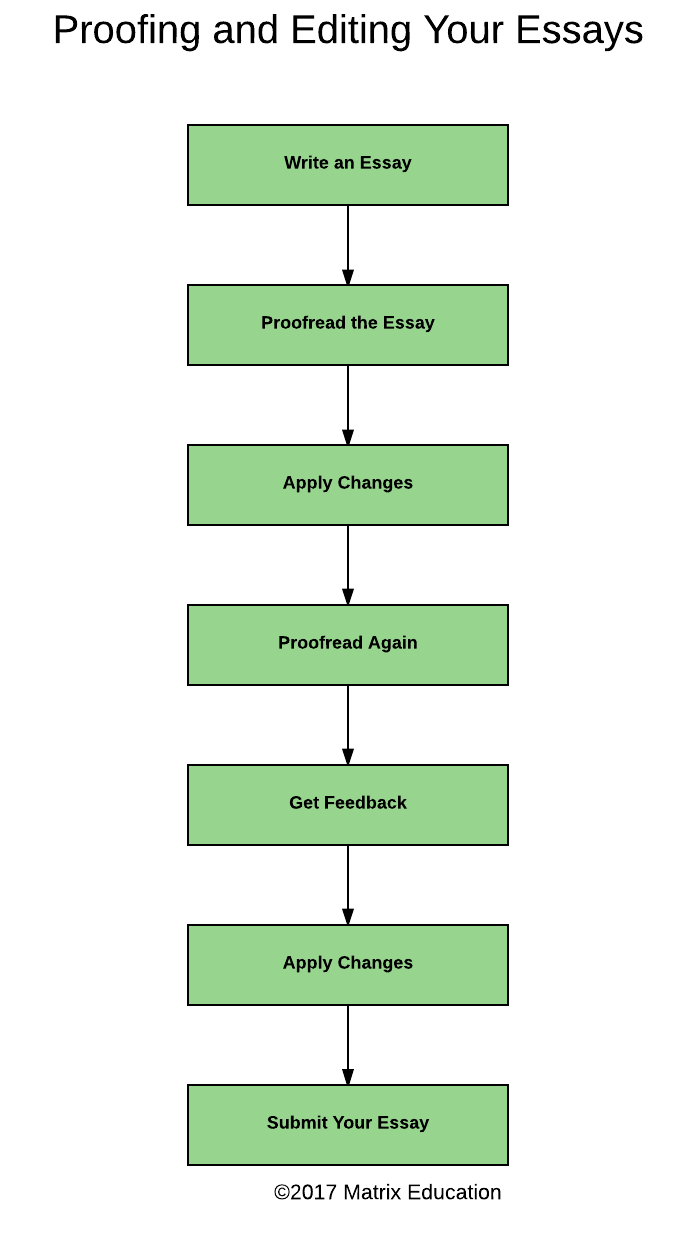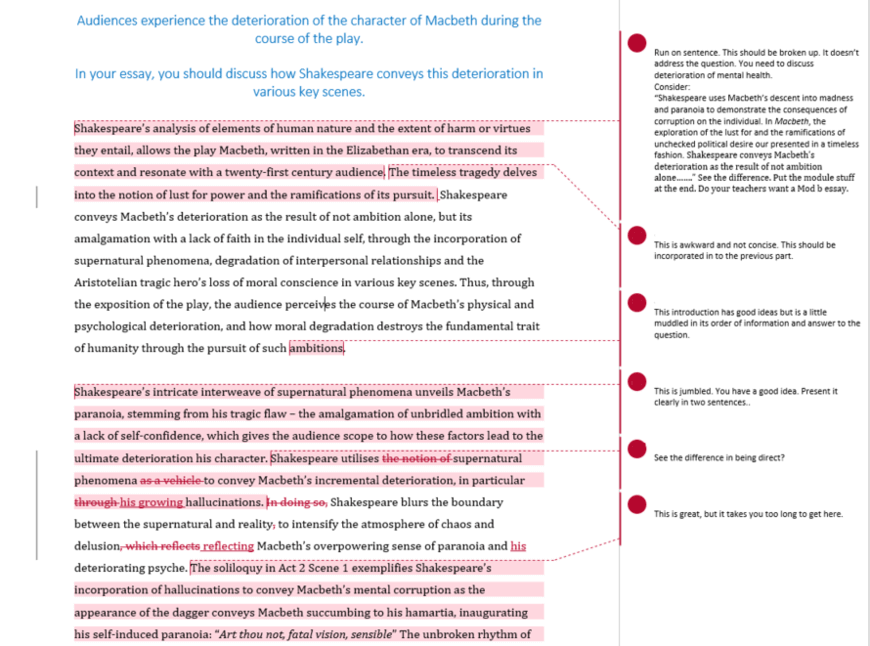HSC English Exam Preparation Course
The Matrix HSC English revision course will help you revise and get exam ready in a week.
Learning methods available
Select a year to see available courses

Guide Chapters
Do you know how to edit your essay? You need to revise your work to make sure that it is easy to read and that your ideas are clear and concise. Poor grammar and spelling detract from the readability of your writing. Poor essay structure makes it hard to follow the logic of your argument. When you submit work, especially in Years 11 and 12, you need to make sure that it is of the highest quality!
You don’t want to throw away marks by not revising and editing your work!
Students often write great responses and then toss away marks on silly errors. Editing is a process that will help you catch these mistakes before they take your Band 6 essays down a notch, or two! You should never submit a first draft, but do you know how to get past the first draft? Often students aren’t aware that there is a method for refining their essays. It’s not a complicated process, but it is an essential one.
Band 6 Matrix Students always edit their work.
So how do you edit an essay? Let’s take a look.
When you edit an essay you want to follow the following process:

Let’s see how to go about editing in detail.
Learn the process for editing and proofreading your essays and creatives. In our English Term Course, we’ll teach your creative writing and the editing skills you will need for essays and creatives. Learn more.
Start HSC English confidently
Expert teachers, detailed feedback, one-to-one help! Learn from home with Matrix+ Online English courses.
If you haven’t done this, and are unsure of where to start, you should read the previous part of this guide, first.
If you want a comprehensive guide to essay writing, check out his series of blog posts:
To proofread is to read your draft “proofs” before submitting them for publication. It is actually harder to proofread one’s own work than somebody else’s, but you must to get into the habit of proofreading and correcting your own work.
The best way to proofread is to read your essay aloud.
We learn grammar and punctuation through speech, so we hear any errors in a sentence’s grammar before we see them. Reading an essay aloud will allow you to spot the sentences that sound “wrong.” Once you have found a sentence that doesn’t sound quite right you can look to see what’s wrong – maybe a comma is in the wrong place, or perhaps it is not a complete sentence. If you are a little bit unsure of your grammar rules, or just out of practice, you can read up on them here.
The detailed steps you need to follow when proofreading are:
Now you’ve spotted the mistakes, you are in the position to start fixing them. Let’s have a look at what that involves.
Editing the essay is when you correct mistakes and restructure the parts don’t present a coherent or sustained argument.
This involves the following process:
1. Make revisions to the structure and content of your essay
If you found that you haven’t answered the question, your essay presents your argument in a convoluted order, or you go on tangents, you will need to correct these.
This will involve rewriting topic sentences, rearranging paragraphs, or perhaps rewriting paragraphs. Some revisions may require you to rewrite a paragraph, don’t be afraid to do this. It may be more work, but it will improve your marks.
2. Proofread your work for grammatical, spelling, and punctuation errors
After making major revisions, you need to proofread again for minor edits. These are spelling and grammatical errors.
Don’t rely on your word processor’s spellcheck, they are not completely accurate! Read each sentence aloud, if possible.
3. Make the necessary corrections to your essay
Correct as you go. This will save time.
4. Proofread the essay again, at least once
You want to be accurate, you should always proofread a couple of times to be sure it is all perfect for seeking feedback!
Just because an essay has been proofed, does not mean it is ready to be submitted. You should try and get a second opinion first! This is called peer feedback, let’s look at what it is.
Teachers often can’t give you feedback on an essay for a school assignment. Increasingly, schools are limiting the number of essays a student can submit to their teacher to keep workloads manageable. The best alternative is to get feedback from your peers.
Remember, criticism is there to help you write better essays, it is not personal! Use it constructively!
Your friends and classmates are studying the same texts in the same way as you. Forming study groups to read texts, make notes, and discuss your essays will help you all get ahead. Peer feedback is incredibly useful, because if your friends aren’t convinced by your argument; are confused by your structure and logic; or can’t read your sentences because they are ungrammatical, then neither will your teacher and markers!
So, how should you go about getting peer feedback?
When you read through your proofreading comments or the peer feedback you receive, you will need to decide how much work you need to do to fix things.

Sometimes you will only need to reword a sentence, clarify a statement, or add an example. This is a fairly simple process of editing. Sometimes you will need to make much larger changes, like rewriting whole paragraphs. In some instances, your essay might not answer the question and you will need to rewrite the whole thing!
There will obviously come a point where you can’t make any more changes. Similarly, you may not be able to redraft it successfully. At this point, you need to go back to your notes and ensure that you have a clear understanding of your text and module. This is not the end of the world! It’s better to learn this before an exam, rather than during an exam!
Everybody makes mistakes. A key difference between Band 6 students and their peers is the ability to learn from their past shortcomings and failures. Getting poor marks and underachieving against your expectations is always hard and disappointing. it is important that we turn those experiences into positives by learning from them.
A failure doesn’t mean you are bad at something, it means that you have to work a bit harder to be good at it.
Let’s discuss some ways to use past failures for future success.
It’s disappointing not to live up your expectations. But what do you do when you fall short in assessments and exams?
Here’s a step-by-step process:
People aren’t born essayists. They improve through continuous practice. If you want to be good at playing a musical instrument you must put in hundreds, if not thousands, of hours practice. Similarly, if you want to be a good essayist, you must practice the skill.
Don’t just write one essay for each subject for practice, write several. When you receive a poor result, seek feedback and write a new one to improve. Matrix English students receive regular workshops on top of their weekly classes that are an ideal opportunity for students to get feedback and advice on school assessments.
Top English students, regardless of what they say, spend lots of time consistently reading, writing, and revising essays to ensure they get Band 6 results.
Now you’re down with editing and proofing, you’re ready to start thinking about the other sort of writing – the creative sort.
© Matrix Education and www.matrix.edu.au, 2023. Unauthorised use and/or duplication of this material without express and written permission from this site’s author and/or owner is strictly prohibited. Excerpts and links may be used, provided that full and clear credit is given to Matrix Education and www.matrix.edu.au with appropriate and specific direction to the original content.